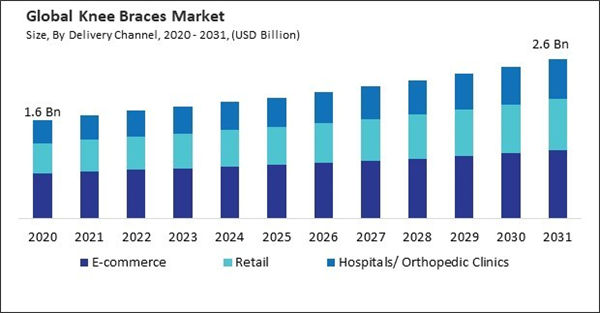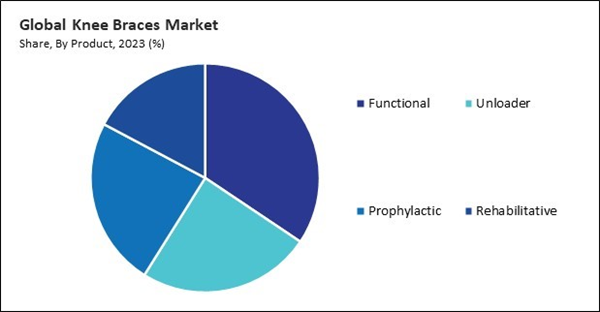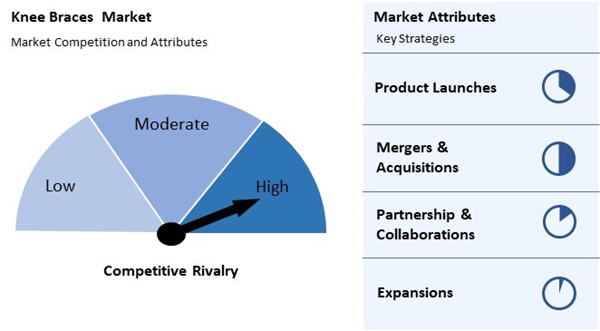North America has a significant prevalence of knee injuries and conditions such as ligament tears, osteoarthritis, and sports-related injuries. Consequently, the North America region captured $622.9 million revenue in the market in 2023. Also, the Mexico market utilized 375.5 thousand units of braces in 2023. The region’s active lifestyle, participation in sports activities, and aging population contribute to the increased incidence of knee problems, driving the demand for knee braces as a supportive and rehabilitative solution.
With more people engaging in sports and fitness activities, knee injuries such as ligament sprains, meniscus tears, and patellar dislocations are likely to be sustained. The increased incidence of these injuries is driven by the need for these braces as a prophylactic intervention to support the knee joint and lower the risk of damage during physical activities. Professional and amateur athletes use the braces to protect against injuries and provide stability during training and competitions. Thus, growing sports participation and fitness trends propel the market’s growth.
Additionally, rapid urbanization and infrastructure development in many regions have led to increased rates of road traffic accidents and workplace injuries, resulting in a higher incidence of knee injuries. ACL injuries in females between the ages of 5 and 14 had the largest yearly growth rate in injury incidence (10.4%), according to demographic research. Similarly, as per the Government of Canada, the total number of injuries from traffic increased to 108,018 in 2021, up 3.6% from 2020 (104,286) in Canada. In conclusion, rising prevalence of knee injuries globally are propelling the market’s growth.
However, in cases of severe traumatic injuries such as complete ligament tears or fractures, it may have limited efficacy as standalone treatments. Individuals with complex knee instabilities due to multiple ligament injuries or ligament laxity may find limited benefit from standard off-the-shelf braces. Custom-made braces or surgical interventions may be necessary to adequately address the specific instability patterns and restore stability to the knee joint. Hence, the limited efficacy for certain conditions impedes the market’s growth.
The pandemic-induced lockdowns, travel restrictions, and trade disruptions disrupted global supply chains, affecting the production and distribution of these braces and related components. Manufacturers faced challenges in sourcing raw materials, components, and packaging materials, leading to production and delivery timelines delays. During the peak of the pandemic, many healthcare facilities postponed or canceled elective surgeries and procedures to prioritize resources for COVID-19 patients and minimize the risk of virus transmission. Thus, the COVID-19 pandemic moderately impacted the market.
By Delivery Channel Analysis
By delivery channel, the market is divided into e-commerce, hospitals/ orthopedic clinics, and retail. In 2023, the E-commerce segment registered the 44.59% revenue share in the market. In terms of volume, E-commerce segment registered 7,498.4 thousand units in 2023. E-commerce platforms offer unparalleled convenience for consumers to browse, compare, and purchase these braces from the comfort of their homes.By Product Analysis
On the basis of product, the market is segmented into unloader, functional, prophylactic, and rehabilitative. In 2023, the prophylactic segment attained a 28.35% revenue share in the market. In terms of volume, prophylactic segment consumed 2,386.8 thousand units in 2023. Prophylactic knee braces are specifically designed to prevent knee injuries before they occur.By Application Analysis
Based on application, the market is divided into arthritis, sports, ligament, and others. In 2023, the arthritis segment garnered the 38.08% revenue share in the market. In terms of volume, arthritis segment make use of 5,422.8 thousand unit in the market in 2023. Arthritis, especially osteoarthritis, causes joint pain and discomfort, particularly in weight-bearing joints like the knees. Also, the prevalence of arthritis is increasing the demand for knee braces.By Regional Analysis
Region-wise, the market is analyzed across North America, Europe, Asia Pacific, and LAMEA. In 2023, the Asia Pacific region generated a 29.09% revenue share in the market. In terms of volume, cans segment would register 4,755.0 thousand units in the market in 2023. The Asia Pacific region has witnessed a surge in sports participation and recreational activities across various age groups.Market Competition and Attributes
The Market exhibits a competitive landscape driven by factors such as technological advancements, product innovation, strategic collaborations, and the presence of key players. Market competition is characterized by a diverse range of manufacturers offering a variety of the braces catering to different consumer needs, including prophylactic, functional, rehabilitative, and unloader braces. Established companies vie for market share through extensive product portfolios, brand recognition, and distribution networks, while emerging players focus on niche segments or innovative technologies to gain a foothold in the market. Overall, the market competition in the Market is intense, fostering ongoing innovation and product development aimed at addressing the evolving needs of patients and healthcare professionals alike.
Recent Strategies Deployed in the Market
- Jan-2024: Enovis Corporation completed the acquisition of LimaCorporate S.p.A., a global orthopedic leader known for innovative implant solutions. The acquisition bolsters Enovis' presence in orthopedic reconstruction with a complementary portfolio, driving global growth and margin expansion.
- Jan-2024: Enovis Corporation's DJO, LLC subsidiary launches the DonJoy ROAM OA knee brace, offering relief for osteoarthritis and knee instability. ROAM OA utilizes cutting-edge unloader technology to alleviate pressure on the knee, easing pain, enhancing stability, and promoting mobility. Additionally, ROAM OA is the forefront of unloader knee braces for active patients with osteoarthritis-related pain.
- Jan-2024: Ossur Hf. acquired Fior & Gentz, a leading manufacturer of neuro-orthotic components for lower limbs, enabling Ossur's entry into the swiftly expanding neuro-orthotics sector. Through this acquisition, Fior & Gentz's primary markets are anticipated to grow at 10-12%, with sales forecasted to exceed this rate while sustaining a strong EBITDA margin exceeding 30%.
- Dec-2023: Tynor Orthotics Private Limited expanded with a groundbreaking manufacturing hub in Mohali, Punjab, featuring cutting-edge technology and infrastructure. This facility, spanning 240,000 square feet, aims to revolutionize orthopedic and healthcare offerings in India and beyond, diversifying its product range to include mobility aids, hot and cold therapy, advanced knee braces, and more.
- Jun-2023: Enovis Corporation acquired Novastep, a global developer of proven foot and ankle solutions, from Amplitude Surgical SA. Novastep bolsters Enovis' presence in the bunion segment with its leading MIS bunion system, Pecaplasty, driving U.S. expansion. Additionally, Novastep's CE-marked forefoot and midfoot implants and strong international distribution channel advance the company's global strategy.
List of Key Companies Profiled
- Enovis Corporation (DJO Global, Inc.)
- 3M Company
- Ossur Hf. (Embla Medical hf.)
- Orthofix Medical, Inc. (Breg, Inc.)
- Mueller Sports Medicine, Inc.
- McDavid, Inc. (EZ GARD Industries, Inc.)
- Bauerfeind AG
- Medi GmbH & Co. KG
- Ottobock SE & Co. KGaA
- Tynor Orthotics Private Limited
Market Report Segmentation
By Delivery Channel (Volume, Thousand Units, USD Billion, 2020-2031)- E-commerce
- Retail
- Hospitals/ Orthopedic Clinics
- Functional
- Unloader
- Prophylactic
- Rehabilitative
- Arthritis
- Sports
- Ligament
- Others
- North America
- US
- Canada
- Mexico
- Rest of North America
- Europe
- Germany
- UK
- France
- Russia
- Spain
- Italy
- Rest of Europe
- Asia Pacific
- China
- Japan
- India
- South Korea
- Singapore
- Malaysia
- Rest of Asia Pacific
- LAMEA
- Brazil
- Argentina
- UAE
- Saudi Arabia
- South Africa
- Nigeria
- Rest of LAMEA
Table of Contents
Companies Mentioned
- Enovis Corporation (DJO Global, Inc.)
- 3M Company
- Ossur Hf. (Embla Medical hf.)
- Orthofix Medical, Inc. (Breg, Inc.)
- Mueller Sports Medicine, Inc.
- McDavid, Inc. (EZ GARD Industries, Inc.)
- Bauerfeind AG
- Medi GmbH & Co. KG
- Ottobock SE & Co. KGaA
- Tynor Orthotics Private Limited











